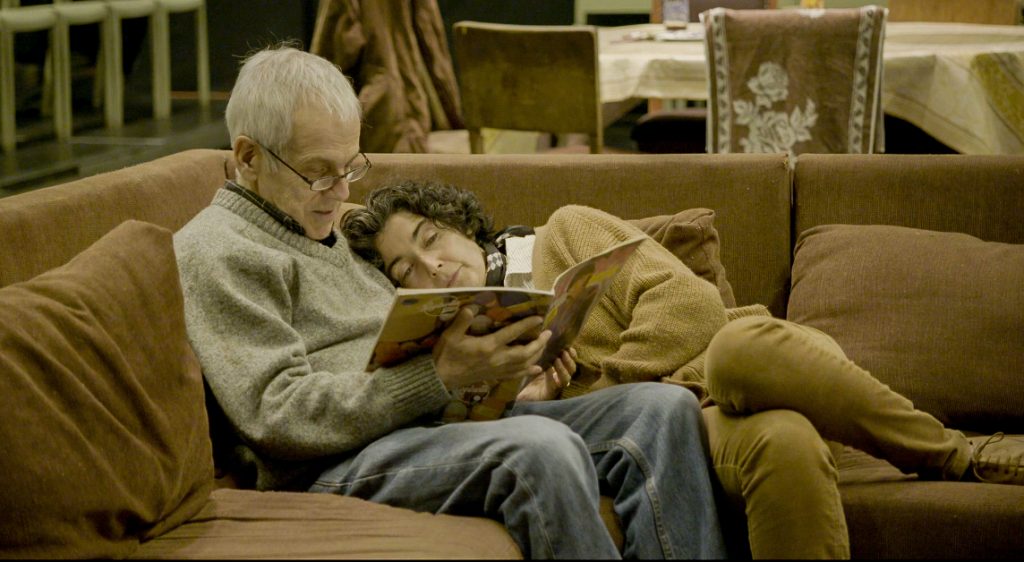Reviews include Superman, Apocalypse in the Tropics, and To a Land Unknown.
TFCA Friday: Week of August 18
August 18, 2023

Welcome to TFCA Friday, a weekly round-up of film reviews and articles by TFCA members.
In Release this Week
Back on the Strip (dir. Chris Spencer)
“A bawdy comedy about male strippers that lives up to mediocre expectations, Back on the Strip is directed and co-written by Chris Spencer who has previously worked with the Wayans Brothers comedy team,” writes Liam Lacey at Original Cin. “That’s a good indication of the sort of patchwork, ribald silliness-slash-parody of the live-nude-males genre, principally the Magic Mike franchise, with bits from Boogie Nights, and the middle-aged male bonding of British feel-good comedy, The Full Monty.”
“Back on the Strip mostly fails to enchant or entertain with its lazy script, co-written by director Spencer and Eric Daniel with and lame performances,” admits Gilbert Seah at Afro Toronto. “The film could be funnier with better comic timing and editing and needless to say, a funnier script with more original jokes. No one really cares too, if Merlin gets back his girl Tobin, which is the film’s major flaw. This is not The Full Monty and certainly not Magic Mike. And if one wants to see a hijacked wedding, best to go see The Graduate again.”
Bad Things (dir. Stewart Thorndike)
“One thing that stands out in this horror flick are the performances of the relatively unknown cast. They create credible characters and clearly give their characters all they got, despite the rather messy script that occasionally is all over the place,” notes Gilbert Seah at Afro Toronto. “But there are also good anticipation scary moments, like the automatic doors opening and closing without anyone visibly entering or exiting the building or the sight of the dining room filled with people (or ghosts) that suddenly disappear the next moment.”
Birth/Rebirth (dir. Laura Moss)
“Director Moss does her utmost best to make her Frankenstein tale as credible as possible. She invests the first third of the film into examining the two characters of her story,” writes Gilbert Seah at Afro Toronto. “She shows a diligent rather worried human being, Rose, just not a crazed experimenter. Moss clearly establishes the raison d’être of both women to continue the Frankenstein experiment much further.”
Blue Beetle (dir. Angel Manuel Soto)
“Blue Beetle has the cultural cachet of being the first Latino-led superhero film, no small achievement in a movie industry that is struggling to diversify,” notes Peter Howell at the Toronto Star. “The film has a not-so-secret weapon, however, which it fully exploits for fun and empathy: the tight migrant family connections of its Mexican-American milieu. Far from being the usual genre stereotype of a loner turned vigilante, our reluctant hero, pre-law grad Jaime Reyes (Xolo Maridueña of Cobra Kai), is a devoted son who keeps his relations close to him at all times.”
“One problem with this film is its originality. Most of what transpires in the film has been seen in one film or another. The transformation of human to blue beetle as well as the transformation of the villain to machine is too similar to the transformer films,” says Gilbert Seah at Afro Toronto. “The humour in the super antihero film reminds one of the Antman films. And there are also similarities of Jaime learning his superpowers as Peter Parker did in the Spider-Man films. The film also runs a bit long at over two hours and could be trimmed shorter and thus more efficient.”
Dark Windows (dir. Alex Heron)
“Where does this go? Nowhere interesting, particularly for the first hour of the 80-minute run time, which plays like a slow Big Brother episode. Eventually, things begin getting ominous in familiar ways. Is that Ali’s voice? Who built a memorial altar to Ali in the kitchen?” asks Liam Lacey at Original Cin. “Also, there’s a guy hanging out in the woods watching everyone. He finally breaks into the house in the last reel, as the flips the film into Hostel torture territory. Following the law of horror movie rule of justice, we’re remind that there’s always a punishment that exceeds the grossness of the original crime.”
The Eternal Memory (dir. Maite Alberdi)
Calling the film “startlingly intimate,” Johanna Schneller speaks with director Maite Alberdi for The Globe and Mail and learns about filming journalist Augusto Gongóra as his memory slips away due to Alzheimer’s: “I completely understood his loves, his obsessions, his pains, because they continued,” Alberdi tells Schneller. “He doesn’t know how many years they’ve been together, but when Pauli asks, ‘Do we have kids together?’ he knows to answer, ‘No. Because you didn’t want that.’ That was painful for him, so that memory is in his body.”
“There won’t be many films—and currently, I can think of none—that are as intensely significant as director Maite Alberdi’s The Eternal Memory,” says Thom Ernst at Original Cin. “Alberdi captures Gongóra and Urrutia in moments both tender and heartbreaking. Their new reality in the face of Gongóra’s disease leaves them lost in a dark cloud of unforgiving loneliness. Gongóra is alone, trapped in fear and confusion. So, too, is Urrutia in her struggle to cope and understand what is becoming of the man she still loves and recognizes.”
“Alberdi’s painful, touching film follows them through his final downturn every sad step of the way. Brief periods of memory are few, replaced by utter confusion, and mood swings, as his exhausted wife and sole caregiver, lovebombs him into calm,” notes Anne Brodie at What She Said. “She keeps him safe, and tries to “reconstruct his memory”. It’s hard to overstate their bond, her dedication, and his painful, rapid decline. Her loving patience shines through with flashes of who he was and the toll of dementia. Brilliant, truthful, intimate, and thorough, this exquisite doc will linger.”
At POV Magazine, Pat Mullen calls the film “the year’s best love story” and speaks with director Maite Alberdi about capturing the drama with such intimacy and respecting elements of consent while telling the story. “I wanted to be with them until the end,” Alberdi tells Mullen. “I wanted to be with them for 10 years, 15 years, 20 years, but the end is an abstract. The end [of shooting], for me, was the moment in the film when Augusto says, ‘I’m not anymore.’ He’s saying, ‘I’m not the person that I used to be anymore.’ That was the clear ending because I didn’t feel comfortable in that moment as a filmmaker. It was the first time that happened to me.”
Filling in the Blanks (dir. Jon Baime)
“Shot in perfectly serviceable docu-tainment style, moreover, it’s an amiable tale. But there isn’t enough here substantially or cinematically to merit a variation on a familiar account. The anecdotal material probably works better as dinner party conversation than as a feature film. Put another way, Filling in the Blanks isn’t exactly Stories We Tell,” notes Pat Mullen at POV Magazine. “The revelations of this tale are obviously life-altering for Baime, and rightly so, but the idiosyncrasies of a family tree don’t have the same bombshell effect for a viewer at home.”
Jules (dir. Marc Turtletaub)
“Jules will make your heart swell with joy. Ben Kingsley stars in an outstanding performance as Milton, a small-town, Pennsylvanian, whose quiet life suddenly upends itself in a deus ex machina kind of way,” writes Anne Brodie at What She Said. “This delightfully zany, heartfelt, witty, and hilarious experience is down to Gavin Steckler’s wicked imaginative and persuasive writing, director by Marc Turtletaub’s deft touch, and sensationally quiet and zany performances by three committed actors and a little hero alien.”
“Jules is a bit of a conundrum. There is a sweetness here in the way Sandy and Joyce, each with their own quirks, come together and rally around Milton and Jules,” says Karen Gordon at Original Cin. “It feeds into a subplot that deals with aging and the loneliness that can come at an age where many feel unseen, unwanted, and purposeless. And thanks to the performances, particularly by the film’s leads, that aspect comes through in a touching way.”
A Life Too Short: The Isabella Nardoni Case
(dir. Micael Langer and Cláudio Manoel)
“Though non-fiction, the case sends shivers through anyone’s spine. The only thing missing in the doc that still remains a mystery is the real motive behind the murder. Definitely a compelling horror true crime story,” writes Gilbert Seah at Afro Toronto.
The Monkey King (dir. Anthony Stacchi)
“There is no coming-of-age story for this money kid/king who wishes to belong, nor are there any life lessons or messages or social commentary. The Monkey King is clean and simplified animated entertainment that would satisfy if one does not expect too much from one’s entertainment,” writes Gilbert Seah at Afro Toronto.
Piglady (dir. Adam Ray Fair; Aug. 22)
“Director Fair delivers his horror with lots of anticipation, guts and grossness with Piglady ending up entertaining in a grotesque and disgusting kind of way,” oinks Gilbert Seah at Afro Toronto.
Reinventing Elvis: The Comeback Special (dir. John Scheinfeld)
“Notably, the stories by those who were involved with the special are vibrantly brought to life with beautifully restored clips and photos of Elvis during the special, which are, unquestionably, the highlights of the film,” says Rachel Ho at POV Magazine. Seeing Elvis burst through the creative rut he was in with a raw magnetism all to his own, there’s little doubt in our minds why The ’68 Comeback Special was not only successful in terms of reviving Elvis’ career, but why it has stood the test of time as a piece of music history.”
At Exclaim!, Rachel Ho speaks with subject Steve Binder about making the legendary TV special with Elvis Presley. “I’d spent so much time with Elvis and we had so many intimate moments. We were in my offices on the Sunset Strip when Bobby Kennedy was assassinated at the Ambassador Hotel,” Binder tells Ho. “We watched it live on a television set in my office and spent the rest of the evening talking about what’s going on with our country with all these assassinations, the war, and the protests from the kids on campuses throughout the country. [We] just forgot about the television special.”
Storage Locker (dir. Ray Spivey; Aug. 22)
At Afro Toronto, Gilbert Seah says the film “is exactly what it intends to be, campy horror, and lame as its storyline and premise might be, delivers what one would expect.”
Strays (dir. Josh Greenbaum)
“In much the same vein as Seth Rogen’s Sausage Party, Strays — also decidedly not suitable for children — garlands its heavy themes with guffawing comedy. Unlike the animated Sausage Party, the talking dogs are real (well, the dog part of them anyway) and thus so much more sympathetic. The message is clear: sure, laugh but for fuck’s sake (mimicking movie again) take care of them,” notes Kim Hughes at Original Cin. “That’s it — the entirety of the message wrapped in kooky comedic dressing — but that’s huge coming from a film as high-profile and well-bankrolled as this one.”
This Place (dir. V.T. Nayani)
“This Place would have improved by taking a step back with some self-aware humour. Though the filmmakers’ thoughtful, therapeutic approach thankfully avoids rom-com and melodramatic clichés, too often This Place plays like a thesis in search of a dramatic form,” admits Liam Lacey at Original Cin. “The schematic structure and mundane dialogue never allow it to blossom into three-dimensional fictional reality, making this play like the demo version of a richer film that really should be made.”
https://youtu.be/TbU2kIUMu0k
Untold: Hall of Shame (dir. Bryan Storkel)
“The most impressive feat this doc achieves are the candid interviews director Storkel has obtained from both Conte and Notvitzky both often denying what the other says,” notes Gilbert Seah at Afro Toronto. “The archive footage of all the record breakers that have used steroids also add to the urgency of the doc.”
A Festival of Festival Coverage: TIFF Previews Continue!
At the Toronto Star, Peter Howell reports on recent additions to the TIFF 2023 line-up: “The final three new Special Presentations titles are: Christy Hall’s relationship drama Daddio, an international premiere starring Dakota Johnson and Sean Penn; Ryûsuke Hamaguchi’s drama Evil Does Not Exist, the North American premiere of the new film by the Japanese writer/director of Oscar-winning Drive My Car; and the Canadian premiere of The Promised Land, a colonization drama by Denmark’s Nikolaj Arcel (A Royal Affair) starring Mads Mikkelsen and Amanda Collin,” notes Howell.
TV Talk/ Series Stuff
At What She Said, Anne Brodie is enrapt by the Nordic drama Fenris: “We open on Daniel, a young lad deep in the forest at night, apparently tracking a wolf. As disturbing as that is, we’re seeing it unfold via hidden surveillance cameras,” says Brodie. “Hella gripping and a quality production.” On the other hand, she doesn’t mince words with Casey Anthony: Where the Truth Lies: “This is one of the most vexing, feckless, self-pitying, cunning narcissists I’ve seen in a life of viewing documentaries. I don’t know what the purpose is in giving Anthony a platform except for the fact that it will do well. You’ll need a shower after watching. Several showers,” advises Brodie. Anne also encourages you to tune into Stand Up for Cancer on Saturday night: “The one-hour telecast has a new look and you’ll learn how the movement has engendered real change in life-saving cancer research,” she says.



